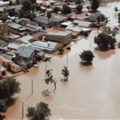Cooperative Governance and Traditional Affairs (CoGTA) Minister Velenkosini Hlabisa says South Africa is at an increased risk of natural disasters and needs a “new system” to manage these challenges more effectively.

Image: Flooding in Cape Town recently -
@SAgovnews“I wish to take this time to also convey our deepest condolences to the loved ones of those who have tragically lost their lives. We also acknowledge work undertaken to rebuild our societies and we urge all government structures to increase the speed of responding to the plight of communities,” Hlabisa said on Wednesday during his Budget Vote Speech.
He recognised the vital role played by the department following the floods and fires currently affecting communities in the Western Cape and KwaZulu-Natal.
“We have learned with heavy hearts of the passing of 14 people who died in the veld fires in KZN. Among the 14, six were firefighters, some volunteers. These brave men and women paid the ultimate price to save communities. We convey our heartfelt condolences to the loved ones of all the victims. May their souls find eternal rest.”
Budget
Hlabisa tabled the CoGTA 2024/25 budget, at R395.7bn, with a significant portion 95.9% (R379.61bn) to be transferred to municipalities and affiliated entities.
A total of R379.6bn of the department’s total budget over the Medium-Term Expenditure Framework (MTEF) period will primarily cover the local government equitable share, disaster relief grant and the municipal infrastructure grant.
The Minister recognised that it was only through the department’s urgent interventions that lives and livelihoods were saved and thanked all those who are collaborating with government to assist distressed communities.
Hlabisa and his team are expected to visit the affected areas in KwaZulu-Natal to assess the situation and provide support.
In Cape Town, over 33,000 households have been affected across the metropole in both formal and informal settings following the floods, affecting some 95,000 people.
“We recognise that the challenges we face in disaster management are largely because South Africa has experienced not only an increase in the number of disasters - such as droughts, floods, Covid-19, and severe weather – but also an increase in their magnitude, severity, and impact.
“These events have occurred either simultaneously or in rapid succession, straining our resources and systems.”
Challenges
However, the Minister believes that the challenges faced in disaster management are primarily due to deficiencies in regulatory legislation, which are not designed to adapt to the ever-changing risk environment.
“The systemic and structural design of our disaster management delivery, as guided by current laws, results in issues with timing and bureaucracy. Key elements of the disaster management function were assigned to municipalities through legislation, but without funding.”
He told the Members of Parliament (MPs) that this created a contradiction between the Disaster Management Act and the Municipal Systems Act (MSA) which requires sufficient funding and capacity for assigned functions.
“Consequently, municipalities lack the necessary funding and capacity.”
He admitted that government’s response has struggled with agility, efficiency, and effectiveness in risk analysis, prevention, mitigation, emergency preparedness, early warning systems, and recovery services.
He told MPs that the fire and rescue services also face significant hurdles and that in 2022, Cabinet mandated the National Disaster Management Centre (NDMC) to review and overhaul the disaster management system, including fire services.
“In response to this, we are proposing a new system for disaster management and fire services.”
Improving governance
This system, he said, aims to improve governance by reorganising administrative structures and financing models to better respond to growing disaster risks.
“We have since developed a new model based on best practices from New Zealand, Russia, Brazil, Mozambique, California, and Australia. The new model emphasises risk reduction and integrates disaster management into all levels of government planning, ensuring adequate funding and focus on resilience.”
He told Parliament that the NDMC undertook extensive consultations with all stakeholders through existing disaster management structures and across the three spheres of government and that inputs were received and used to refine the proposed model.
“We look forward to working with all stakeholders in the management of disasters, including rolling out training to Houses of Traditional Leadership, particularly those in disaster-prone areas, on disaster management.
“This will enable them to work closely with all spheres of government and stakeholders on the ground to assist in disasters. An implementation plan has been developed in this regard for effective implementation of this training,” he added.
This year, the department also signed a Memorandum of Collaboration with the Department of Defence that will see the Community Work Programme (CWP) participants playing a role in disaster preparedness and community development.








































